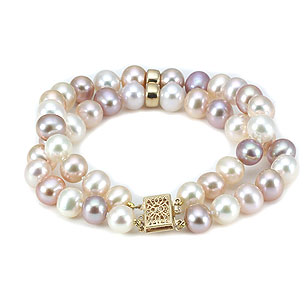Freshwater Cultured Pearls - "Activated", not Nucleated

There has been much discussion about how to accurately describe the culturing process of Chinese freshwater pearls. Unlike Akoya pearls that begin with the insertion of a bead nucleus, freshwater pearls begin with a piece of mantle tissue that causes irritation and begins the process of making a pearl. The tissue is ultimately absorbed and the pearl that is formed is essentially "all pearl" rather than a bead with pearl nacre surrounding it. In this important way freshwater pearls are much more like natural pearls than bead nucleated cultured pearls.
Until recently freshwater pearls were refered to as "tissue nucleated" but that terminology has been called into question by many since the finished pearl contains no nucleus. German pearl expert Elizabeth Strack, author of the book "Perlen" argues that freshwater pearls are not nucleated but rather "activated" by the insertion of mantle tissue which becomes the precursor of a pearl sack in which the pearl grows.
A significant outcome of the scientific discussion is the change that the American Gem Trade Association's Gem Testing Center has made to its reports. The reports now read that these pearls consist of "approximately 100 percent pearl nacre".
Chinese freshwater pearls have come on very strong in the marketplace in the last few years for their variety of natural colors, their ever improving size, roundness, luster and skin quality. In addition to being appreciated for their beauty and value, now they are also getting more respect for the very nature of the pearl.

